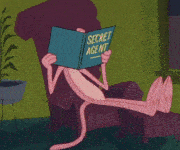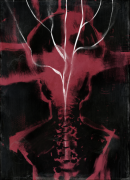|
Ague Proof posted:
The fact that I recognized this quote depresses me.
|
|
|
|

|
| # ? May 11, 2024 10:07 |
|
jivjov posted:It has aspects of many things all at once. It was an aspect in three parts.
|
|
|
Troll Bridgington posted:The fact that I recognized this quote depresses me.  
|
|
|
|
|
jivjov posted:But you combine those things with the "sharp stone" comparison and the knowledge that the description is being applied to a sword to get to "dangerous" I took it more to mean hidden danger. You might look at it and not see it as extremely dangerous or you might not even realize it's there hidden under the water but when you are crossing the river and you trip and fall onto the rock it is plenty deadly/dangerous (or if you were being pulled downstream). I can maybe accept that the different use of language doesn't make sense, going from otherworldly to natural but even then it is a magic fantasy sword, maybe it is both. Anyway what I'm saying is this is not nearly Rothfuss's worst transgression. I think he's a total rear end and that he is highly overrated but I just don't see how this one phrase is getting so much interest.
|
|
|
Lyon posted:Anyway what I'm saying is this is not nearly Rothfuss's worst transgression. I think he's a total rear end and that he is highly overrated but I just don't see how this one phrase is getting so much interest. Because jivjov cannot let any slight against Rothfuss, no matter how minor, pass without debate.
|
|
|
|
|
Ornamented Death posted:Because jivjov cannot let any slight against Rothfuss, no matter how minor, pass without debate. I'll defend the concept of an abstract metaphor any day. Edit: seriously though...people are going "uhhhh, water isn't deadly, stones aren't deadly; how does metaphor work" even in the face of multiple descriptions of various things the metaphor can evoke. jivjov fucked around with this message at 20:17 on Feb 18, 2016 |
|
|
|
It is not a good metaphor, but for a different reason, and this is observable through a critical reading. It's counterproductive to latch onto a single thing (what is silence in three parts, is Kvothe a Mary Sue, is this book double-ironic subversion of heroism) and debate it back and forth, because it distracts from the larger context. Careful reading will reveal all things. In this case, the sword ends up serving as a microcosm of the deeper failure of the book, where the confusion of signifiers conceals a lack of meaning.
|
|
|
Troll Bridgington posted:The fact that I recognized this quote depresses me.
|
|
|
|
|
Solice Kirsk posted:It was an aspect in three parts. I'm sorry, but there's only two parts. The third is just Fallout 4.
|
|
|
|
In some strange way I hope that if I ever do get my work published someone as talented and dedicated as BotL gives it a similar treatment. It seems like a great "ripping off the bandaid" way of improving your writing.
|
|
|
|
ManlyGrunting posted:In some strange way I hope that if I ever do get my work published someone as talented and dedicated as BotL gives it a similar treatment. It seems like a great "ripping off the bandaid" way of improving your writing. From my personal if limited experience, editors of even smaller-scale magazines make the stuff Lamps is doing here look like a mother's gentle kisses. There's are practical concerns on the production side of this - eventually a writer has to go "gently caress it, good enough" and punt a piece out into the world, warts and all - but you'd be hard-pressed to find any writing that couldn't be reamed to some degree on its first several drafts. Though hopefully katanas wouldn't be involved.
|
|
|
|
ChickenWing posted:I would like it to be noted that I love the poo poo out of these books, and yet it's oddly satisfying to see them eviscerated in such a fashion. If a bloke sets up a soapbox on the street and starts talking passionately about something he seems to know a lot about, he'll draw a crowd even if he's talking complete cobblers. Passion is fun to watch be expressed.
|
|
|
|
Odette posted:I'm sorry, but there's only two parts. The third is just Fallout 4. This was fitting, as the third silence was the deepest and most encompassing of the three, enfolding the others in itself. It was the plain paper sound of a blank book being narrated.
|
|
|
|
LET’S READ THE KINGKILLER CHRONICLE CRITICALLY Part 5: “’If I seem to wander, if I seem to stray, remember that true stories seldom take the straightest way.’” In Chapter 6, “The Price of Remembering”, we begin the story proper. Chronicler has recovered, and reveals he knows Kvothe through a mutual acquaintance. Kvothe is intent on staying in hiding, while Chronicler wants to set down his story. quote:“You don’t get it, do you?” Kote shook his head, stuck between amusement and exasperation. “That’s the whole point. People don’t look for you when you’re dead. Old enemies don’t try to settle scores. People don’t come asking you for stories,” he said acidly. While the myth of Kvothe is central to the narrative, it is never properly explained, and in fact acknowledged as lies and half-truths: quote:The stories are saying ‘assassin’ not ‘hero.’ Kvothe the Arcane and Kvothe Kingkiller are two very different men.” Stories and storytelling are recurring motifs. Stories are told, stories hold truth, stories lie, and so on. The story of The Kingkiller Chronicle is Kvothe recounting his life and adventures. What’s odd is the hero-worship of Kvothe: every effort is made to emphasise that Kvothe is exceptional, which is why he’s the subject of the story. I’ve explained what inescapable problem this presents to the narrative, and I’ll return to it later. For now, the narration establishes that Kvothe is exceptional, even when it contradicts his present characterisation. Kvothe embodies no ideal that sets him apart: he is merely an angry and bitter man in hiding. This is not used to create interesting contrast between the man and the legend, and the narration instead states Kvothe to be exceptional as he is now: quote:Kote turned. “What can any of them know about her?” he asked softly. Chronicler’s breath stopped when he saw Kote’s face. The placid innkeeper’s expression was like a shattered mask. Underneath, Kote’s expression was haunted, eyes half in this world, half elsewhere, remembering. This is utterly ridiculous. It's also again is in that uncomfortable middle ground between realism and fantasy, the result of an inconsistent tone and style. Robert E. Howard can handle something as ludicrous by keeping an elevated tone throughout his stories: The People of the Black Circle posted:‘The king dares not trample a worm in the road? Little fool, do you not realize that your royal pride is no more than a straw blown on the wind? I, who have known the kisses of the queens of Hell! ...” It is bombastic and ridiculous, but that is the appeal of the Conan stories. The other way Rothfuss underlines Kvothe’s sheer exceptionalism is with constant references to his physical features, primarily his eyes and hair. Sometimes changes in expressions constitute dramatic action, even. quote:Chronicler’s serious expression returned. “Three days is quite unusual. But then again—” Some of the self-importance seemed to leak out of him. “Then again,” he made a gesture as if to show how useless words were. “You are Kvothe.” By the end Kvothe reluctantly agrees to tell his story and tell “truth of things”, which will take three days. In Chapter 7, “Of Beginnings and the Names of Things,” the framing story is finally giving way to the main narrative. While preparing, Kvothe reveals his mental abilities by decoding Chronicle’s system of short-hand. While this again is supposed to characterise Kvothe as exceptional, it is too mechanical to register as impressive. quote:“Wonderfully efficient system,” Kvothe said appreciatively. “Very logical. Did you design it yourself?” Kvothe has a bombastic speech to start his story. It includes his list of names, which was soundly trashed on the very first page of this thread. I don’t feel the need to add more than what a goonsay does, except for one small observation: we are never told what the story of Kvothe is about. Obviously Kvothe is the subject, but what does Kvothe represent in the larger scheme of things? Heroism? Exceptionality? Multiplicity? It's a self-referential nightmare. This would be the most obvious moment for the story to smuggle in its programmatic statement. There is no mention of a central theme, a matter of no small concern. The closest is the implication that Kvothe restlessly moves through different roles, but this is not a theme as much a motif, and not one used in the story. Umberto Eco’s Baudolino, on the other hand, does not hesitate to justify itself and its themes The framing story is set during the sack of Constantinople in 1204, which provides the perfect thematic impetus for a search of meaning in chaos. Baudolino, the hero, has rescued statesman and historian Niketas Choniates, and desires to tell his story as the world has fallen apart. Baudolino posted:“You will tell me what you remember. I receive scraps of events, fragments of actions, and I extract a story from them, woven by a design of Providence. In saving my life you have given me what little future remains to me and I will repay you by giving you back the past you have lost…” Baudolino posted:“Master Niketas, the problem of my life is that I’ve always confused what I saw with what I wanted to see.” In both quotes we can discern the theme of the story: the nature of meaning. Now I don’t actually consider Baudolino to be the greatest novel ever written despite the impression I may have given, but I wholeheartedly recommend it. And here the novel is doubly important because it reads like a deliberate response to Kingkiller. The connections will be explored more as our read-along proceeds. For now we can take another look at the quotes again. Eco’s dialogue is decidedly unrealistic, but he uses it to his advantage: the characters can speak freely of themselves and their ideas. In Kingkiller, on the other hand, characters speak fast and rough, but still need to communicate their characters, ideas, and themes. Then we reach Kvothe’s monologue, which characterises him as self-obsessed and vainglorious. quote:I have stolen princesses back from sleeping barrow kings. I burned down the town of Trebon. I have spent the night with Felurian and left with both my sanity and my life. I was expelled from the University at a younger age than most people are allowed in. I tread paths by moonlight that others fear to speak of during day. I have talked to Gods, loved women, and written songs that make the minstrels weep. ROTHFUSSIAN ATTRIBUTES quote:Inside the Waystone, the light fell across Chronicler’s face and touched a beginning there, a blank page waiting the first words of a story. The light flowed across the bar, scattered a thousand tiny rainbow beginnings from the colored bottles, and climbed the wall toward the sword, as if searching for one final beginning. BravestOfTheLamps fucked around with this message at 20:42 on Dec 5, 2016 |
|
|
|
The participle phrases in this man's dialogue attributions are overlong and overwrought, and it discomfits me.
|
|
|
|
Oxxidation posted:From my personal if limited experience, editors of even smaller-scale magazines make the stuff Lamps is doing here look like a mother's gentle kisses. There's are practical concerns on the production side of this - eventually a writer has to go "gently caress it, good enough" and punt a piece out into the world, warts and all - but you'd be hard-pressed to find any writing that couldn't be reamed to some degree on its first several drafts. Though hopefully katanas wouldn't be involved. If editing is that brutal than why is Lamps having to do the job Rothfuss's editor should have done?
|
|
|
|
Oxxidation posted:The participle phrases in this man's dialogue attributions are overlong and overwrought, and it discomfits me. What about the adverbs? Patrick Rothfuss posted:“Imagine my relief,” Kote said sarcastically.
|
|
|
|
Wait. Isn't Folly supposed to be Cinder's sword and not Kvothe's? I seem to remember it being described as broken in the second book and the kid from town going off to join the army pointed out it wasn't anything like Kvothe's sword.
|
|
|
|
Solice Kirsk posted:Wait. Isn't Folly supposed to be Cinder's sword and not Kvothe's? I seem to remember it being described as broken in the second book and the kid from town going off to join the army pointed out it wasn't anything like Kvothe's sword. Folly is not Caesura, the sword the Adem gave Kvothe. I don't think we know where Folly came from at this point in the story, only that it is not the same sword.
|
|
|
|
Uranium Phoenix posted:Folly is not Caesura, the sword the Adem gave Kvothe. I don't think we know where Folly came from at this point in the story, only that it is not the same sword. Then Rothfuss wasn't necessarily describing a katana with all those clunky metaphors. That makes it a little less nerdy at least.
|
|
|
|
DISCLAIMER I don't actually hate D&D. LET’S READ THE KINGKILLER CHRONICLE CRITICALLY Part 6: "My father made a face. 'Not a very good play.' I shrugged. 'They won’t know the difference.'” In chapter 8, “Thieves, Heretics, and Whores,” the story proper begins. Kvothe begins narrating with his childhood in a band of gypsy performers. And when I say “gypsies,” I mean no slur. They are romanticised outsiders by the way of Romani people. Here we can start discussing Kingkiller's bizarre positions on class and race: quote:
quote:Now you have to understand that twenty pennies might be a good bit of money for some little ragamuffin troupe living hand-to-mouth. But for us it was simply insulting. He should have offered us forty to play for the evening, free use of the public hall, a good meal, and beds at the inn. The last we would graciously decline, as their beds were no doubt lousy and those in our wagons were not. quote:That was the hardest part of growing up Edema Ruh. We are strangers everywhere. Many folk view us as vagabonds and beggars, while others deem us little more than thieves, heretics, and whores. It’s hard to be wrongfully accused, but it’s worse when the people looking down on you are clods who have never read a book or traveled more than twenty miles from the place they were born. Several factors combine to create this baffling portrait of “gypsies”. First, there is the traditional romantic view of the “gypsy” lifestyle as free and full of wonders. Second, there is the removal of anything to mark “gypsies” as outsider or cultural Others besides their employment as itinerant performers. Thirdly, there’s the removal of anything to mark the “gypsies” as a marginalised class, because this band is styled after an Elizabethan/Jacobean acting troupe that looks down on parochial villagers. Rothfuss’s failure in portraying a marginalised group is that he insists on making them modern and liberal, which means removing any conflict save for between liberalism and parochialism. Kvothe’s mother is, in fact, a former noble seduced by Kvothe’s father to join the “gypsy” lifestyle! Kvothe is also insistent on how his father and mother were not married because they felt themselves free to decide about their own lives. The gypsy band also includes occasional tag-alongs. This again confuses “gypsy” communities with traveling performers. In contrast, kinship and marriage ties are hugely important parts of real Romani cultures. Kvothe’s troupe has arrived in a town whose mayor is trying to turn them away, but Kvothe’s father threatens him with the name of their lordly patron. They triumph over the bullying mayor and are allowed to stay in the town. But the town officials also try to turn away Abenthy, or Ben, a travelling wizard who in response scares them by controlling the wind: quote:“Shut your clepper, you old poo poo-fire,” the constable said. He snatched at the arcanist’s arm as if he were sticking his hand into an oven. Then, when nothing happened, he smiled and grew more confident. “Don’t think I won’t knock you a good one to keep you from working any more of your devilry.” This is again inconsistent tone, where dull realism (“poo poo-fire”?) and whimsy are forced to occupy the same passage. Contrast the simple brutality of the constable bullying the wizard and the wizard’s overblown threats. Kvothe observes this and joins the wizard. Kvothe’s and Ben’s meeting is the first example of  actually good writing actually good writing so far: so far:quote:I brought my hand out of my pocket. “Can you sell me anything for a penny?” This is a good back and forth - dialogue. There’s a contrast of fanciful ideas and reality, an interesting character relationship, and the clarifications serve as comedy. “Filled my young mind with intrigue and assassinations” and “touted as an infallible cure-all” are all excellent phrases. If it was trimmed to flow better, it could have come out of Jack Vance’s pen: Cugel’s Saga posted:The clerk returned. He started to go to his ledger, then noticed Cugel. "Did you want something?" Kvothe, intrigued, wants to study under Ben and invites him into their troupe. It’s only later that Kvothe understands that Abenthy was wielding “the name of the wind”. So the central motif of the book is thus mastery, the ability to control one’s environment, which is at odds with the story so far. The imagery of mastery and controlling the wind imply power, authority, and hubris, while Kvothe is primarily an outsider-figure. His character exemplifies anger and bitterness, but not towards himself. This is because the book doesn’t exploit the metaphorical power of this device properly: as we learn, controlling the primal forces of nature is a skill, like short-hand. It's treated with only the bare minimum of mysticism, even if the logic behind it is quite intriguing in principle. This, again, speaks of the influence of D&D, where magic is mechanical and quantifiable. This in turn was appropriated from the Dying Earth stories of Jack Vance (hence the term “Vancian casting”), where magic becoming a series of strict, quantified rote actions was used to show how decayed and impoverished the world was. Rather fitting, I suppose. In Chapter 9, “Riding in the Wagon with Ben,” we’re treated to an explanation of what makes a wizard such as Ben different. Ben was trained to become a wizard at the University, which qualifies him to dismiss petty conjurers and frauds: quote:He took a deep breath. “Just because someone knows a trick or two doesn’t mean they’re an arcanist. They might know how to set a bone or read Eld Vintic. Maybe they even know a little sympathy. But—” One might assume at first that such class pretension from an itinerant salesman is meant to characterise him as a blowhard, but Ben’s pride is not satirical. Kingkiller also treats the notion of an academic degree in sorcery very seriously. The Harry Potter series always treated its magic school with satire and whimsy. The fabled Scholomance was a hidden and forbidding place. For medieval scholars it was a tradition of fraud. But for Kingkiller, academic magic is not satirical or fantastical at all. There’s also a brief discussion of how people may be born with mutant abilities that are magic. Ben begins teaching Kvothe, who starts on his road to becoming a polymath: quote:This was levels beyond the simple memorization I had practiced for the stage. My mind was learning to work in different ways, becoming stronger. It felt the same way your body feels after a day of splitting wood, or swimming, or sex. You feel exhausted, languorous, and almost Godlike. This feeling was similar, except it was my intellect that was weary and expanded, languid and latently powerful. I could feel my mind starting to awaken. Chapter 10, “Alar and Several Stones,” is brief and shows Kvothe learning a technique to hold two beliefs simultaneously, which is necessary for practicing magic. The problem is that this completely spurious exercise is part of a novel that tries to be realistic. quote:He also taught me a game called Seek the Stone. The point of the game was to have one part of your mind hide an imaginary stone in an imaginary room. Then you had another, separate part of your mind try to find it. ROTHFUSSIAN WISDOM quote:I learned the sordid inner workings of the royal court in Modeg from a…courtesan. As my father used to say: “Call a jack a jack. Call a spade a spade. But always call a whore a lady. Their lives are hard enough, and it never hurts to be polite.” BravestOfTheLamps fucked around with this message at 13:52 on Dec 9, 2016 |
|
|
|
That Seek the Stone game sounded totally implausible to me when I read it, but if you kind of look at it like a reverse Method of loci I guess maybe somewhere, sometime, someone could potentially be able to do it with consistency. Maybe.
|
|
|
|
botl your posts are high quality
|
|
|
|
quote:Abenthy tapped his lips thoughtfully. “Can you answer me a question in the meantime?” I nodded. “Whose troupe is that?” Is this Rothfuss's failure to use good attribution, or did you accidentally forget to hit enter before "I nodded"?
|
|
|
|
BananaNutkins posted:Is this Rothfuss's failure to use good attribution, or did you accidentally forget to hit enter before "I nodded"? It's how it reads in the e-book edition I have.
|
|
|
|
I have a paperback copy (sigh, goon secret santa) so I checked it for giggles and it's the same there too.
|
|
|
|
jivjov posted:Yeah; sharp stone beneath swift water is really evocative for me. Maybe it's just because I personally got a cut from a sharp rock in a river on one of the very few camping trips I went on as a kid I've cut my feet on sharp rocks while getting into boats and similar a few times, and its painful sometimes, but usually you never notice until later, and its like, "oh, I'm bleeding, oh, well, salt water is meant to be good for cuts". Maybe if he'd said, "as dangerous as a sharp rock in swift water FILLED WITH PIRANHAS!" It would feel dangerous.
|
|
|
|
BravestOfTheLamps posted:It's how it reads in the e-book edition I have. What are your feelings on it? As a writer, it drives me crazy, it looks like a rookie mistake, and in complicated scenes it results in text that is difficult to follow. On the other hand, it makes a paragraph look nice, and eliminates unwanted emphasis on the bland "I nodded." by having it on a line by itself. quote:“You’d probably call it magic,” Abenthy said reluctantly. “It’s not, really.” He shrugged. “But even knowing sympathy doesn’t make you an arcanist. A true arcanist has worked his way through the Arcanum at the University.” The double Abenthy attribution here is also terrible to my eye. You don't need Abenthy said reluctantly AND He shrugged. They both serve the same purpose--identifying Abenthy as the speaker, and showing his dismissal of sympathy as "magic". MartingaleJack fucked around with this message at 04:27 on Feb 22, 2016 |
|
|
|
I'm skipping 100 pages to ask: Is the third book coming out this year Y or N
|
|
|
|
Don Tacorleone posted:I'm skipping 100 pages to ask: Is the third book coming out this year Y or N Nope. There would be a significant lead time between finished book and actual delivery to store shelves, even if he were done today, and he's not. Alternately, lawl, Rothfuss ain't writing.
|
|
|
|
BananaNutkins posted:What are your feelings on it? As a writer, it drives me crazy, it looks like a rookie mistake, and in complicated scenes it results in text that is difficult to follow. I'm of the opinion that it's a valid stylistic choice because it makes the paragraph look neater and it doesn't put unwarranted emphasis on "I nodded". Sure, in a complicated scene it could be more difficult to follow, but this is not a complicated scene.
|
|
|
|
BananaNutkins posted:What are your feelings on it? It's a stylistic choice, but again is indicative of a larger problem rather than the problem in itself. Rothfuss emphasises certain things to visualise a scene, which smells of writing classes. I was busy this weekend, will update later.
|
|
|
|
Don Tacorleone posted:I'm skipping 100 pages to ask: Is the third book coming out this year Y or N
|
|
|
Aquarium Gravel posted:Nope. There would be a significant lead time between finished book and actual delivery to store shelves, even if he were done today, and he's not. In general yes, but Rothfuss is a best-seller and there's a lot of people waiting on the book. When (If) the book is ever done, the publisher will almost certainly fast-track it through the production process. If a 100% finished manuscript (including all editing) were submitted for printing by, oh, say June or so, it is possible that we'd see the third book this year. Of course, there's no way Rothfuss will even have a first draft done in that time frame, so basically you're right  . .
|
|
|
|
|
BananaNutkins posted:What are your feelings on it? As a writer, it drives me crazy, it looks like a rookie mistake, and in complicated scenes it results in text that is difficult to follow. Using the listener's actions as a dialogue attribution is a valid choice, but it's probably not a good idea to do so when the attribution follows a question mark, since that can be either a half-stop or a full stop to the dialogue depending on the situation. A clumsier but less syntactically vague way to phrase it would be something like, quote:“Can you answer me a question in the meantime?” he asked. I nodded. “Whose troupe is that?” English: We Don't Know What We're Doing
|
|
|
|
LET’S READ THE KINGKILLER CHRONICLE CRITICALLY Part 7: "I think making you sit and listen to the rest of my story should be punishment enough." Chapter 11, “The Binding of Iron,” is where Ben start teaching magic to Kvothe. First their teacher-student relationship is explored with some fictional history: quote:
Two things to take away from this chapter: first, despite characters talking about representational currency as part of the fantasy world, this is not satirical or humorous. Second, like mentioned in the discussion, Rothfuss visualizes characters too much. Every gesture, shift in expression, and physical movement is described whenever possible. quote:“Good enough,” Ben broke in, startling me. “So these two drabs,” he held a pair out for my inspection, “Could have come from the same bar, right?” I suspect this is a straitjacket of English classes or fiction writing courses. Characters must act constantly, and speak and tend to speak in short lines unless outright lecturing. There’s little room for abstracted action or monologues. This would imply a story where every minute detail was relevant, but the main story of Kingkiller is about remembrance. The story should abstract and summarise more, and focus on the themes and ideas it presents in Kvothe’s development. Mika Waltari does exactly so in The Egyptian. Like Kingkiller and Baudolino, The Egyptian uses the same device of the protagonist recounting their life. Notice how the descriptions always underline what’s most important about the character and the situation: The Egyptian posted:“There will never be war again,” declared the heir to the throne. Horemheb laughed. After this the nature of magic is explained: the first brand of magic is named after the principle of Sympathy, coined by George Frazer in The Golden Bough. To sum it up, wizards create a mental connection between to similar objects, and can then manipulate them by affecting one of the objects. The second brand is Naming, which involves controlling something by knowing it's "true name". quote:I was rather disappointed. At least as disappointed as I could be in the Heart of Stone. I lifted the coin in my hand, and the coin on the table lifted itself in a similar fashion. It was magic, there was no doubt about that. But I felt rather underwhelmed. I had been expecting…I don’t know what I’d been expecting. It wasn’t this. The intention is here is to reveal a prosaic truth behind magic by making it a scientific discipline. In contrast, Naming is “true” magic in the sense that it’s a mysterious, liminal force. Yet it’s also an academic subject, and ends up being as prosaic as Sympathy for reasons that I described in the previous part. There’s a clumsy segue into Kvothe singing a song that offends his mother, which shows that his childhood was sometimes rough even before his family was murdered by a band of supervillains. The reason it was inserted is that it’s very likely foreshadowing about Kvothe’s mother’s identity. What really sticks out is that Rothfuss uses the words “sexual innuendo” in this novel, which Is a stretch for even satire (which Kingkiller isn’t). quote:It seemed mostly nonsense rhyme. But when I ran it back through my head, I saw the rather obvious sexual innuendo. Chapter 12, “Puzzle Pieces Fitting,” involves Kvothe’s parents more. I haven’t talked about them too much, mostly because they’re uninteresting aside from the stuff I’ve mentioned. He’s a dramatist, she’s a runaway noblewoman, they have a playful relationship, and they’re called Arliden and Laurian respectively. Arliden is gathering material about the Chandrian, legendary boogeymen whose true nature is shrouded in mystery (yet which I have inferred and will reveal later on). The Chandrian are a complete mystery, a group of seven demonic figures who perpetrate atrocities seemingly at random, and without “rhyme or reason”. Superstitions about them exist for a reason, and even Ben hesitates to mention their names. Then the scene shifts to everyone talking about how intelligent, capable, and in every way exceptional Kvothe is. Ben wants for him to go the University to get a degree in wizardry. quote:“If he decides to become an arcanist, I bet he’ll have a royal appointment by the time he’s twenty-four. If he gets it into his head to be a merchant I don’t doubt he’ll own half the world by the time he dies.” Chapter Thirteen, “Interlude—Flesh with Blood Beneath,” per its name returns to the present of the Waystone Inn. It also has three revelations. Chronicler meets Bast, who he reveals to be a Fae creature by using iron. Chronicler, in turn, is also revealed to be a wizard who can control iron. This is an incredibly prosaic way to introduce supernatural elements. Kvothe gets angry with the two, and is revealed to be twenty-five years old or at least look twenty-five. quote:Kvothe’s voice grew quiet, “If you do not stop this foolishness, you may both leave now. One of you will be left with a slim sliver of story, and the other can search out a new teacher. If there is one thing I will not abide, it is the folly of a willful pride.” If this is true, any hope for authenticity in Kingkiller is lost, because Kvothe being a figure of legend and subject of a thousand stories recounted across the world is simply at odds with him also being twenty-something. Here, for example, Kvothe is supposed to a menacing and authoritative because of his dark and violent past, but he is also twenty-five years old. And in general Kvothe the innkeeper is written as a bitter and world-weary old man. His youth simply does not fit his characterization. There is repeated emphasis on how dangerous Kvothe seemed for a moment: quote:Kvothe poured something from the green bottle into the glasses. This simple gesture changed him. He seemed to fade back into himself, until there was little left of the dark-eyed man who’d stood behind the bar a moment ago. The dramatic action in this scene is anything but. Chronicler remains a thin character, while Bast’s true nature is revealed in a wholly prosaic manner. quote:As Chronicler gathered his paper and quills, Kvothe studied the angle of the sun through the window, a pensive look on his face. Eventually he turned to Bast. “How much did you manage to overhear?” JUST ROTHFUSS THINGS Remember this part from Part 5? quote:Chronicler found himself thinking of a story he had heard. One of the many. The story told of how Kvothe had gone looking for his heart’s desire. He had to trick a demon to get it. But once it rested in his hand, he was forced to fight an angel to keep it. I believe it, Chronicler found himself thinking. Before it was just a story, but now I can believe it. This is the face of a man who has killed an angel. For some reason Rothfuss slips it in again: quote:Then he saw Kvothe’s eyes. They had deepened to a green so dark they were nearly black. This is who I came to see, Chronicler thought to himself, this is the man who counseled kings and walked old roads with nothing but his wit to guide him. This is the man whose name has become both praise and curse at the University. BravestOfTheLamps fucked around with this message at 23:30 on Jan 2, 2017 |
|
|
|
It really is hard to imagine all these cool things and foreshadowing are going to lead up to anything at all since he has managed to tell almost precisely none of it in the two giant books he has released so far. Bast did more in his short story than Kvothe did in Wise Man's Fear.
|
|
|
|
Does aggrandizing a character to this extent ever end well? I haven't seen a case this severe since the Drizzt Forgotten Realms books (I was eleven and I got them out of my dad's attic, don't judge).
|
|
|
|
Ornamented Death posted:In general yes, but Rothfuss is a best-seller and there's a lot of people waiting on the book. When (If) the book is ever done, the publisher will almost certainly fast-track it through the production process. If a 100% finished manuscript (including all editing) were submitted for printing by, oh, say June or so, it is possible that we'd see the third book this year. Possibly even later. George R R Martin's publishers thought they could do everything first in 5 months and then later in 3: quote:We all wanted book six of A SONG OF ICE AND FIRE to come out before season six of the HBO show aired. Assuming the show would return in early April, that meant THE WINDS OF WINTER had to be published before the end of March, at the latest. For that to happen, my publishers told me, they would need the completed manuscript before the end of October.
|
|
|
|

|
| # ? May 11, 2024 10:07 |
|
quote:If there is one thing I will not abide, it is the folly of a willful pride. I literally lmao'd when I read this.
|
|
|


































